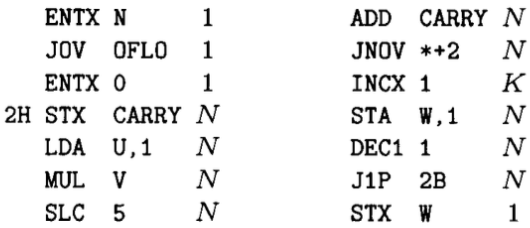Perfect Power Checker in Julia
A perfect power is an integer \(m\) whose \(n^\text{th}\) root is an integer \(a\). That is,—
$$ m = a^n $$For a very long time, intermittently, I have been trying to write an efficient function to check if a number is a perfect power or not. It's been about 5 months now actually, and I can't remember why. All I recall is that I wanted to know specifically if a number was a perfect power or not—not necessarily what numbers combine to produce the given number.
I think I came across the issue when doing coding theory. There is no known perfect codes for alphabet size of non-perfect-powers. And I was wondering if there is a good programmatic solution to this.
Well, the naïve solution is to check every combination:
for a in 1:m
for n in 1:m
a^n == m && return true
end
end
return false
But this is very slow. In fact, fast enough for 8-bit integers, but extremely slow for anything more.
After some searching, I found a 1997 article by Daniel J. Bernstein titled "Detecting Perfect Powers in Essentially Linear Time". After days of trying to translate this into Julia, I realised that he had used his own floating point number representation that he heavily relied on in his logic... This is something I don't want to have to do: reinvent the wheel Float. He also used a divrem method that required some some steps digit-by-digits, designed by Knuth:
 My port into Julia is certainly not the fastest solution. I figured that anything I wrote would likely not be as theoretically efficient as in the paper.
My port into Julia is certainly not the fastest solution. I figured that anything I wrote would likely not be as theoretically efficient as in the paper.
So I contacted Mr. Bernstein asking for advice. He got back to me referencing another paper—an updated version of the former—which he also wrote, in 2004, titled "Factoring into coprimes in essentially linear time". I started workin on this one in Julia too, but was stuck at the first step...in which he uses the previous paper to generate a list of prime powers (which, let's not forget, are themselves perfect powers)... Beginning to feel very circular!
I put this project on the back burner while I wrapped up my exploratory work with Dillon Mayhew, but just this evening it has found me again. I was looking through my GitHub stars, and I found IntegerSequences.jl, which looks to be largely written by one Peter Luschny. I looked through the code because I was curious, and found an isPrimePower function! Looking deeper, I extracted the bits I needed, and modified/optimised the code a little, and came up with the following:
using Nemo: isprime, factor, fmpz
function __isprime(n)
return isprime(fmpz(n))
end
function __factors(n)
return n == 0 ? [] : factor(fmpz(n))
end
function ω(n)
nprimedivisors = nothing
if n == 0
nprimedivisors = 0
elseif __isprime(n)
nprimedivisors = 1
else
nprimedivisors = length(__factors(n))
end
return fmpz(nprimedivisors)
end
function Ω(n)
n == fmpz(0) && return 0
__isprime(n) && return fmpz(1)
return sum(e for (__, e) ∈ __factors(n))
end
function isperfectpower(n)
return ω(n) == 1 && Ω(n) != 1
end
This is actually blazingly fast. I did some benchmarking, and I will put the results here. Unfortunately the only comparisons we can realistically make (as I don't have all night) are ones on small integers, as larger integers simply scale too much for the brute force method.
| Perfect Power Implementation | List Type | List Size | Run Time | Number of Allocations | Memory Usage |
|---|---|---|---|---|---|
Brute force (bf) | Int8 | 100 | 1.358 ms | 11 | 2.11 KiB |
Clever (c) | Int8 | 100 | 122.749 μs | 2,927 | 170.95 KiB |
bf | Int8 | 1,000 | 16.382 ms | 10 | 32.66 KiB |
c | Int8 | 1,000 | 1.235 ms | 28,877 | 1.62 MiB |
bf | Int8 | 10,000 | 179.624 ms | 12 | 166.48 KiB |
c | Int8 | 10,000 | 12.616 ms | 286,870 | 16.25 MiB |
bf | Int8 | 1,000,000 | 17.701 s | 12 | 16.21 MiB |
c | Int8 | 1,000,000 | 3.141 s | 28,784,244 | 1.59 GiB |
c | Int16 | 100 | 23.333 μs | 2,551 | 153.39 KiB |
c | Int32 | 100 | 650.484 μs | 2,347 | 152.25 KiB |
c | Int64 | 100 | 13.342 ms | 2,044 | 1.30 MiB |
c | Int128 | 100 | 4.182 s | 5,547,237 | 960.02 MiB |
c | Int128 | 1,000 | 40.835 s | 51,785,224 | 8.46 GiB |
c | Int128 | 10,000 | 669.043 s | 532,334,303 | 89.17 GiB |
Going a bit deeper into why this method works so seemingly efficiently, we need to